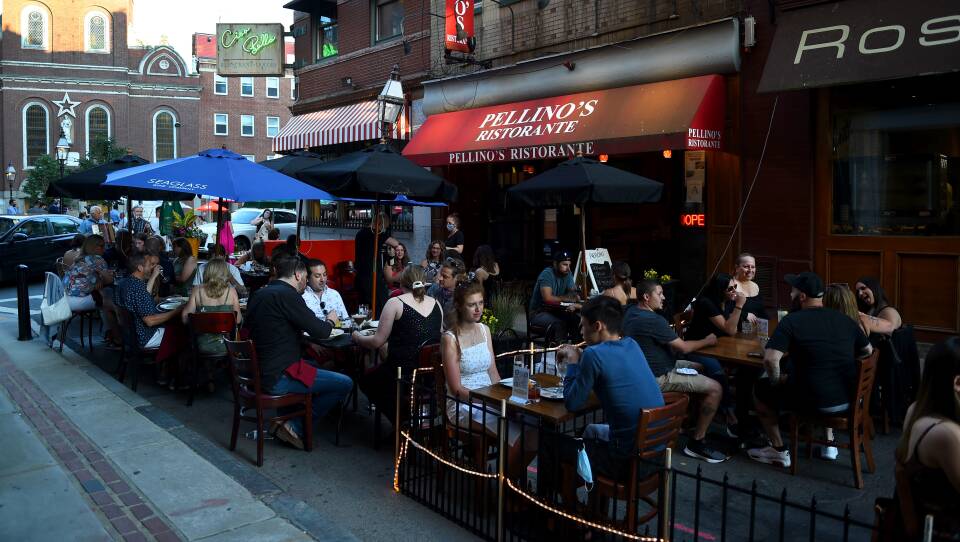COVID-19 forced Massachusetts residents to communicate on video conferencing technology, rely on take-out food and exposed weaknesses in the state's health care system. But with the pandemic not quite over, lawmakers are under the gun over the next eight days to extend a handful of emergency laws and policies to cushion the local economy's return to in-person living.
Though most pandemic restrictions on businesses and the general public have already ended, Gov. Charlie Baker has decided to officially end the Commonwealth's state of emergency June 15. When that happens, numerous protections and policies put in place to coincide with the emergency order will terminate, including some the governor and lawmakers may like to see stick around a little longer. If lawmakers don't get a bill extending the provisions to Baker in time, there could be a gap in services, programs and authorizations that could seriously disrupt businesses just getting back on their feet.
Baker kicked off the push to extend pandemic provisions by filing a bill with three simple goals: allowing local government bodies to meet virtually, extending outdoor dining and shielding patients from COVID-related health care costs. After asking for a full list of all the emergency rules coming to an end June 15, the Senate got to work rewriting Baker's bill while the House tasked five top leaders to conduct a parallel effort to draw up designs.
"While the Baker Administration filed a nominal bill in the Senate to extend three COVID-related measures, the House recognizes that we cannot wait to start our own process," House Speaker Mariano's spokeswoman Ana Vivas wrote in a statement announcing the working group.
The House and Senate are now scrambling to put together a package of proposals favored by lawmakers that can pass ahead of that June 15 deadline. Here's a look at some of the pandemic emergency policies seen as likely to be extended and what some advocates want to see made permanent.
COCKTAILS TO GO
The most talked-about emergency rule put in place to stem the economic impact the pandemic has had on eateries was the one that let restaurants pack up beer, wine and cocktails with takeout orders, something forbidden in puritan Massachusetts before the pandemic.
"Just because the state of emergency is going to be lifted soon, that does not mean that these restaurants are not going to continue to see struggles, " Sen. Diana DiZoglio, the sponsor of the to-go cocktail measure, told GBH News.
Continuing the booze-to-go provision is popular with restaurant owners and patrons, but the influential liquor store lobby, which is made up of a powerful partnership between major retailers and smaller mom and pop shops, could prevail to bring things back to normal after June 15.
RESTAURANT DELIVERY FEES
Another temporary boon to restaurateurs was the 15% cap lawmakers put on the fees charged by delivery services like Uber Eats, DoorDash and Grubhub. Lawmakers heard loud and clear in 2020 that the newly popular delivery services were taking so much off the top that it hardly made sense for restaurants to maintain a delivery option.
"It's really disappointing to know that occurred in the first place and it's unacceptable for that to happen again," DiZoglio said of what she called the delivery app industry's "price gouging."
With dining rooms reopened to 100% capacity, there's less of a financial pressure on restaurants to rely on delivery orders. The pandemic showed there's an appetite from diners to embrace higher-end meals at home, but the artificially low prices capped by the emergency law may have had something to do with delivery's popularity.
VIRTUAL PUBLIC MEETINGS
Baker's bill would allow town meetings to operate virtually through Sept. 1, which would get through their budgeting and meeting season without worrying about in-person gatherings at town halls.
Baker has expressed a desire for lawmakers to decide on the permanent future of online access to meetings after the summer, but government accountability groups like the ACLU, Common Cause Massachusetts and MASSPIRG want to go much further and make remote access for viewing and participating in all public meetings permanent, which would take an overhaul of the open meeting law.
OUTDOOR DINING
Baker's legislation also allows for cities and towns to grant outdoor dining permits to restaurants through Nov. 29, extending the opportunity for outdoor dining (at least for those who will brave colder weather) well past Thanksgiving. The popularity of al fresco dining as a result of the pandemic, and the investment many restaurants have already put into improving and expanding patios and other spaces, means this change is likely permanent.
COVID HEALTH CARE
To keep with the state's pandemic policy that most COVID-19 health care should be essentially free to patients, Baker wants to extend protections for those in treatment for the virus or facing medical bills for treatment they've already received. His bill would protect patients from charges beyond their insurance coverage for COVID-19-related emergency and inpatient services. Lawmakers tend to like protections like this and may want to go further when they finalize their own pandemic policy extension plan.








